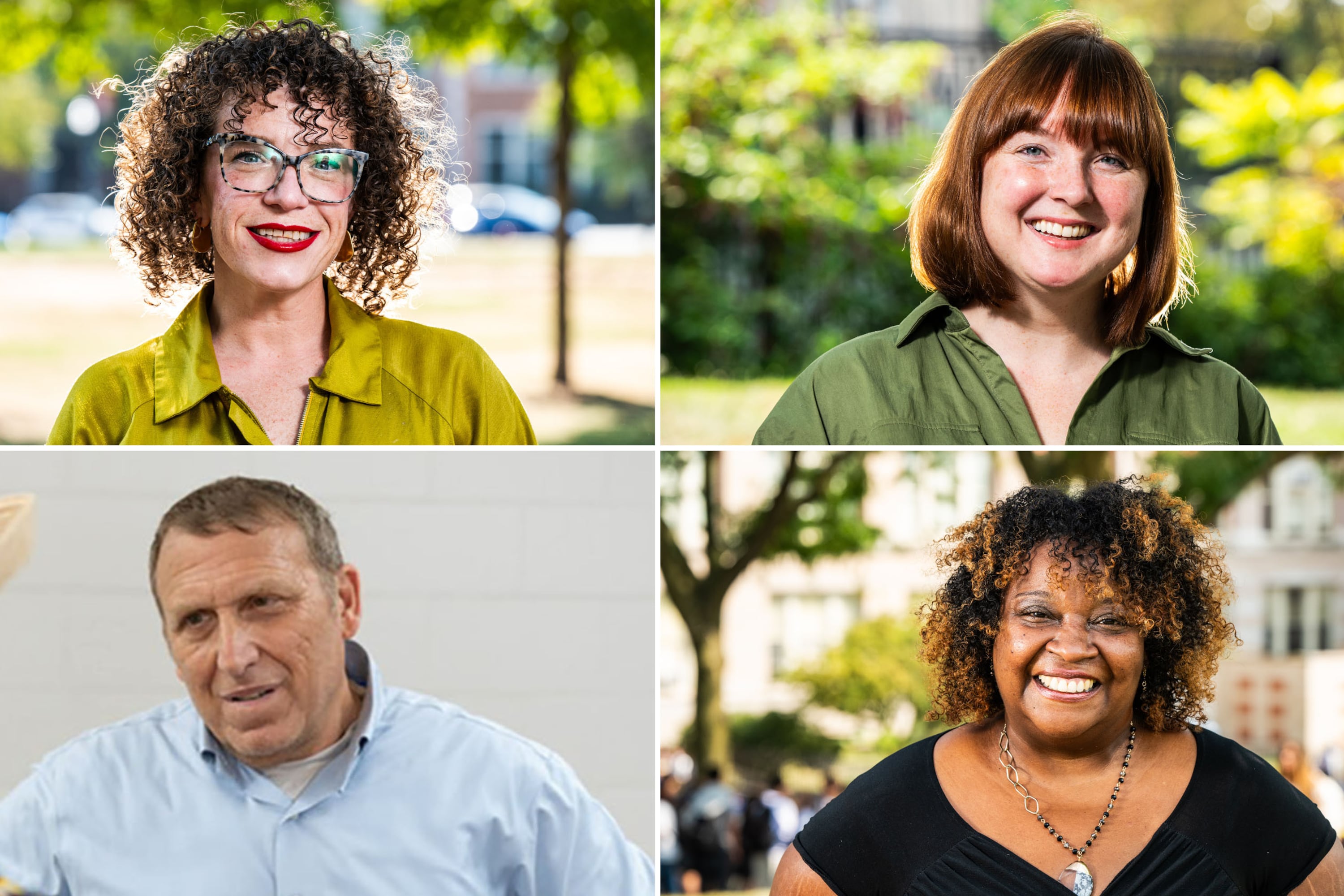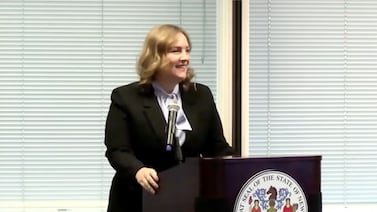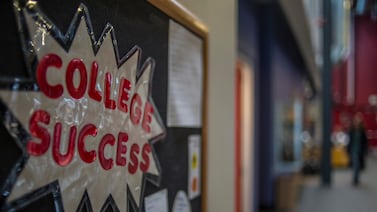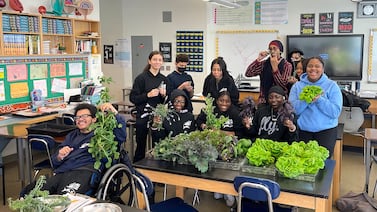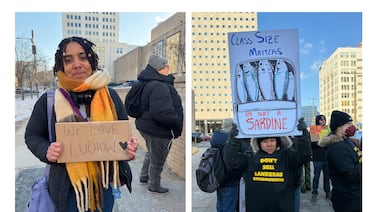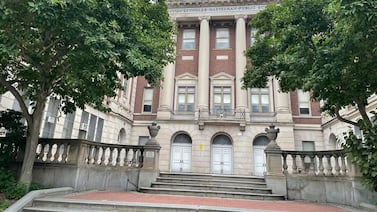Sign up for Chalkbeat Chicago’s free daily newsletter to keep up with the latest education news.
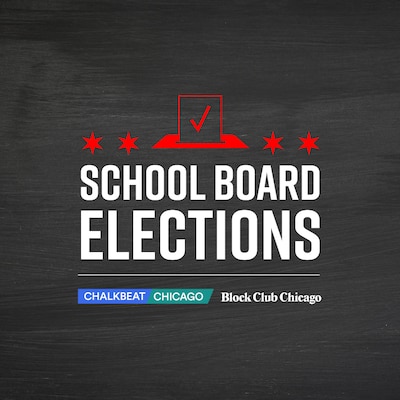
Four candidates are running to represent District 2 on Chicago’s first elected school board.
District 2 covers the far Northeast corner of the city and includes parts of West Ridge, Edgewater, Rogers Park, Andersonville, Lincoln Square, Albany Park, North Park, and Uptown. The candidates are Kate Doyle, Ebony DeBerry, Maggie Cullerton Hooper, and Bruce Leon.
District 2 serves 27,637 students across 37 schools. That includes three magnet schools, which draw in students citywide through a lottery system, and three charter schools, which are privately managed, publicly funded CPS schools that require school board approval to continue operating.
Two schools in District 2 are among the top 10% for academic performance, while three are in the bottom 5%, according to state data.
Latino students are the largest population in District 2, totaling around 42% of students enrolled. Additionally, 21% of students are white and 15% are Black.
In comparison, about 21.5% of residents are Hispanic, 45.4% are white, and 13.4% are Black.
About 38% of District 2’s student population is bilingual, and just under 62% qualify for free and reduced lunch.
Multiple candidates said improving multilingual programming should be a top priority.
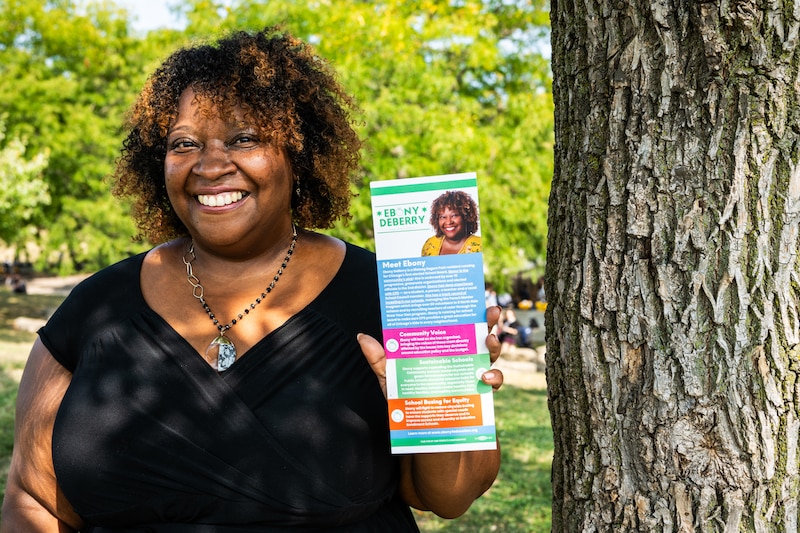
Who is Ebony DeBerry?
DeBerry is a lifelong Rogers Park resident, a former CPS student, teacher, and parent. The 47-year-old graduated from Sullivan High and taught elementary school for CPS in the early 2000s. She also taught in Evanston and Arlington Heights. Her son graduated from Northside College Prep, a CPS selective enrollment high school, in 2021.
In 2012, she started volunteering with the ONE Northside, a nonprofit that helps get neighbors involved in various community issues. She’s worked as ONE Northside’s manager of educational initiatives for the past decade. DeBerry coordinates ONE Northside’s future teacher scholarship program, which works to bring more students of color into education, and coordinates the parent mentor program across eight schools.
“I’ve been fighting alongside parents for more equity and more access for the last 10 years. I’m not going to stop now,” DeBerry said.
While DeBerry said both she and her son had “phenomenal” experiences as CPS students, she was disheartened when she realized he grew up with even fewer teachers of color than she did. If elected, one of her priorities would be strengthening CPS’ relationships with historically Black colleges and universities across the country and with local schools such as Chicago State University and Northeastern Illinois University, which enroll sizable minority populations.
“Our children really can’t be what they can’t see,” DeBerry said. “We have one of the most diverse school systems in Chicago, and it’s important for the teachers to speak the same languages as the students.”
Strong early childhood development programs, tutoring, counseling, and more after-school programs could all help address the opportunity gap, she said.
Another one of DeBerry’s top priorities is increasing parent involvement. She suggested hosting community meetings outside the regular school board meetings and creating a parent newsletter.
DeBerry has raised just over $16,500 as of mid-September, including $8,400 from the political arm of the Chicago Teachers Union, which has paid for field staff.
DeBerry’s endorsements include the Chicago Teachers Union, the Cook County Teachers Union, Ald. Angela Clay (46th), Ald. Maria Hadden (49th), Ald. Andre Vasquez (40th), state Sen. Mike Simmons, and Our Schools Chicago.
Read DeBerry’s full questionnaire responses.
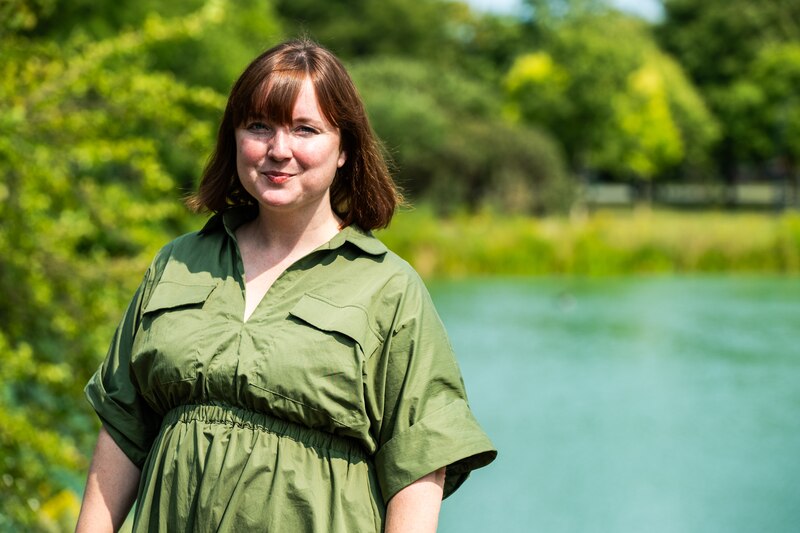
Who is Kate Doyle?
Doyle lives in Lincoln Square, having moved to Chicago from New York in 2020. She spent three years as a special education teacher before transitioning to the tech sector. In 2018, the 35-year-old co-founded KindWork, a New York-based nonprofit that helps train young adults from underserved communities for a career in the tech sector
Doyle also has a 2-year-old son, who she said will attend Waters Elementary, the family’s neighborhood school.
“Being a former teacher, I really am a public school kid, and my Number 1 criteria when moving was I wanted us to live near some great public school options,” Doyle said.
If elected, one of Doyle’s top priorities would be strengthening the bilingual programs in District 2 schools, she said. Rogers Park is one of Chicago’s most diverse neighborhoods, according to a 2020 Sun- Times analysis. The robust cultural diversity on the Far North Side means schools such as Sullivan High enroll students who speak more than 40 different languages at home. District 2 needs more translators for parents and more language resources for students, Doyle said.
Connecting students with a wide-range of postsecondary options and strengthening CPS’ connection to different trade organizations would be priorities for Doyle, she said. As the country continues to face labor shortages in fields like construction and manufacturing, the need for skilled trade workers is growing. Partnerships with trade organizations could help address the local labor shortage while ensuring CPS graduates have access to well-paying union jobs, Doyle said.
Student achievement could be improved by looking through retention data and exit surveys to address teacher burnout and using CPS’ newly-adopted school evaluation policy to get data on what resources should be allocated to which schools, Doyle said.
Some of the young people Doyle works with at KindWorks have talked about their struggles in school, she said.
“When you work in direct service, you can feel like you’re a really effective Band-Aid, but that there’s so much more that needs to be done,” Doyle said. “I started to think about what more I could do at a systems level.”
Doyle has raised about $37,000 as of early September — including a $1,500 from the political arm of a New York-based nonprofit Leadership for Educational Equity, which is affiliated with Teach for America.
Doyle’s endorsements include Ald. Andre Vasquez, 40th Ward Democrats, 40th Ward Democratic Committeeperson Maggie O’Keefe, Cook County Commissioner Bridget Degnen, Personal PAC, Northside Democracy for America, Asian American Midwest Progressives, Ironworkers Local 63, and CPS Parents for Buses.
Read Doyle’s full questionnaire responses.
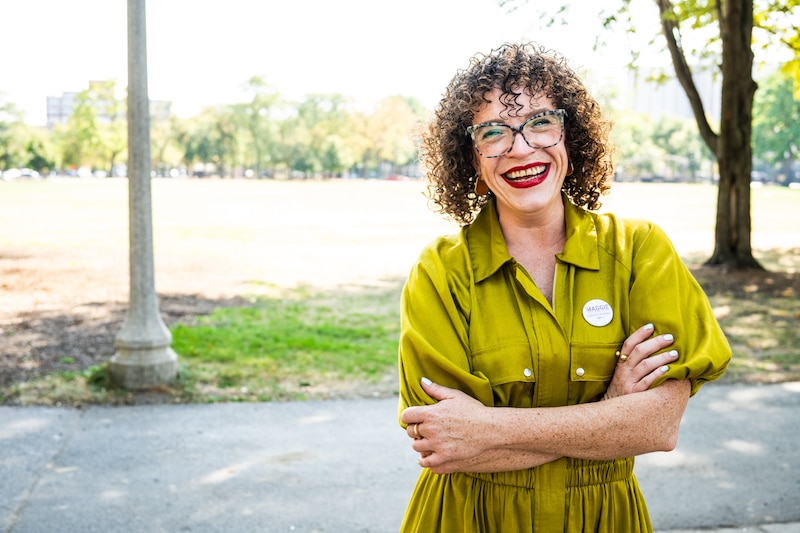
Who is Margaret “Maggie” Cullerton Hooper?
Cullerton Hooper grew up in Wrigleyville and Boystown and currently lives in Albany Park. The 43-year-old is the daughter of former Illinois Senate President John Cullerton and has experience working in government and nonprofit management. She previously worked for the city’s Department of Cultural Affairs and Special Events and for the Mayor’s Office as the chief philanthropy and partnerships officer under former Mayor Lori Lightfoot. She is currently contracting for the Alliance for Black Equality, a Super PAC working to mobilize Black voters.
Cullerton Hooper’s son and daughter attend Hibbard Elementary, their neighborhood school. She has also served on the Hibbard Local School Council for seven years, including two years as chair.
“I would bring a level of experience and understanding of city government that would be really beneficial to the Board of Education, especially to a new board,” Cullerton Hooper said. “I can bring that institutional policy knowledge.”
As the parent of a child with an Individualized Education Program, or IEP, investing in special education is important to Cullerton Hooper, she said. Currently, many CPS schools allocate special education funding by looking at the number of students who had IEPs the year before and subtracting the number of graduating students, Cullerton Hooper said. Under this model, many schools are left understaffed and under-resourced until the middle of the year when new staff are hired, she said.
If elected, Cullerton Hooper hopes to change this funding model so that special education staff have more job security, students have more continuity, and schools have more funding.
Cullerton Hooper said she also wants to give parents more access to the Board of Education by holding community meetings before and after board decisions and offering more bilingual language services at Local School Council meetings.
Cullerton Hooper has raised about $74,000 as of early September, with $20,000 from her father and $5,000 from Don Levin, owner of the Chicago Wolves hockey team.
Her endorsements include U.S. Rep. Jan Schakowsky, U.S. Rep. Mike Quigley, City Clerk Anna Valencia, CPS Parents for Buses, and Teamsters Joint Council 25, as well as IUOE Local 150 and 399.
Read Cullerton Hooper’s full questionnaire responses.
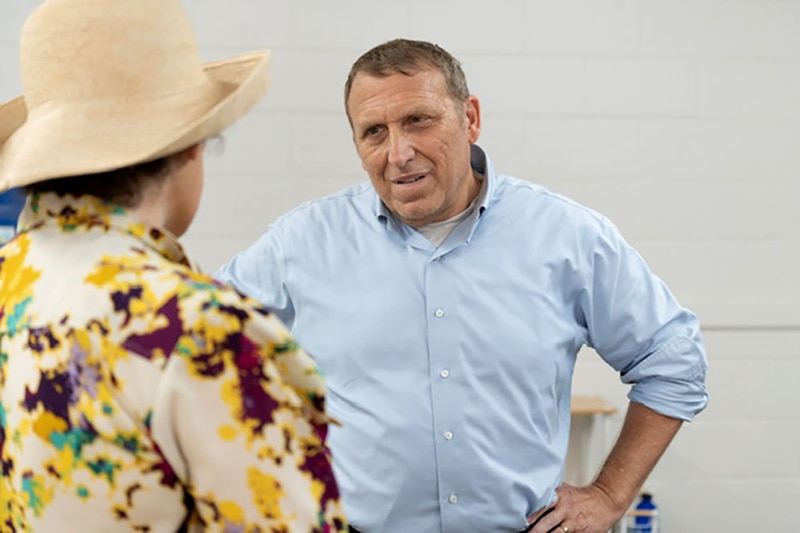
Who is Bruce Leon?
Leon is a fifth-generation Chicagoan who lives in West Rogers Park and is a 50th Ward Democratic Committeeperson. His four daughters attended a Jewish day school in Chicago and he runs a charity with his family.
Leon decided to throw his hat in the ring after the other District 2 candidates discussed their platforms during a spring forum, he said. He thought they were “better suited for LSC and PTA versus helping run a $10.2 billion enterprise,” he said.
The 62-year-old touted his experience running TandemHR, an outsourcing firm he started in 1997 with just two employees. Leon grew TandemHR to a company of over 200 and sold the majority of it in 2020, he said. The remainder of the company was sold earlier this year.
“The school district budget is not a small thing,” Leon said. “I founded and ran a small business very successfully for 30 years and I think that kind of financial experience is needed on the board.”
If elected, Leon said one of his top priorities would be to expand school choice by restoring all busing services to selective enrollment and magnet schools. He also said school funding should be divided equally between magnet, selective enrollment, and neighborhood schools.
“I think selective schools and charter schools are important,” Leon said. “I want to build up the neighborhood schools, but not at the expense of our high-performing schools.. You don’t cut down other schools to make everybody equal.”
Leon loaned his campaign $95,000 on Sept. 2 and has reported no additional donations larger than $1,000 since then.
His endorsements include Ald. Debra Silverstein (50th), Ald. Gilbert Villegas (36th), state Rep. Kevin John Olickal, and state Sen. Ram Villivalam.
Read Leon’s full questionnaire responses.
This story was published in partnership with Block Club Chicago.

